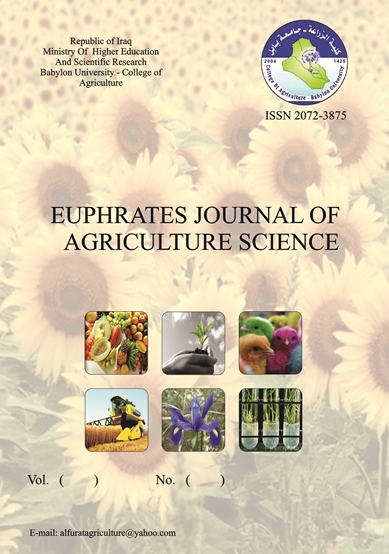Abstract
The current study was carried out to investigate some immunohistopathological effects of
bovine bile salts against Salmonella typhimurium. In laboratory animal thirty albino rabbits
of both sex that ages ranged between (10-12) months were divided randomly into three
groups ,the first group immunized orally by 0.5ml (5mg/ml) and the second group
immunized orally with 0.3ml (3mg/ml) of bile salts in zero time after two weeks the same
doses repeated against Salmonella typhimurium, then delayed type hypersensitivity test was
made on these groups and compared with the third group "that had been inoculated with 0.5
ml of sterile PBS as a control group at day 27 post immunization using soluble bile salts. At
day 30 half number of animals from each group were scarified. Then challenge dose by 1ml
of salmonella typhi were injected intraperitoneally (I/P) for the remaining half of all study
groups ,then after three days they scarified. Samples of blood were collected from each group
to ELIZA analysis for determine the level of IgG in serum in order to obtain their tissues for
histopathological .The results showed that marked necrotic lesion, together with blood vessel
congestion accompanied by hyperplasia with hypertrophy goblet cell of intestine and
thickness of splenic capsule due to mononuclear cells (MNCs) infiltration. While the
immunized groups with bile salts revealed presence of granulomatous lesion in liver with
lymphoid hyperplasia and slight megakaryocyte proliferation in spleen. Finally, the results
showed that the bile salts was highly immunogenic against Salmonella typhimurium and its
toxins and this may be related to the fact that the one of component of bile salts deoxy cholic
acid in their structure which has the ability of destroyed effect on salmonella and their toxins
in the rabbits tissues.
Keywords: Salmonella typhimurium, Bile salts, Rabbits, ELISA.
bovine bile salts against Salmonella typhimurium. In laboratory animal thirty albino rabbits
of both sex that ages ranged between (10-12) months were divided randomly into three
groups ,the first group immunized orally by 0.5ml (5mg/ml) and the second group
immunized orally with 0.3ml (3mg/ml) of bile salts in zero time after two weeks the same
doses repeated against Salmonella typhimurium, then delayed type hypersensitivity test was
made on these groups and compared with the third group "that had been inoculated with 0.5
ml of sterile PBS as a control group at day 27 post immunization using soluble bile salts. At
day 30 half number of animals from each group were scarified. Then challenge dose by 1ml
of salmonella typhi were injected intraperitoneally (I/P) for the remaining half of all study
groups ,then after three days they scarified. Samples of blood were collected from each group
to ELIZA analysis for determine the level of IgG in serum in order to obtain their tissues for
histopathological .The results showed that marked necrotic lesion, together with blood vessel
congestion accompanied by hyperplasia with hypertrophy goblet cell of intestine and
thickness of splenic capsule due to mononuclear cells (MNCs) infiltration. While the
immunized groups with bile salts revealed presence of granulomatous lesion in liver with
lymphoid hyperplasia and slight megakaryocyte proliferation in spleen. Finally, the results
showed that the bile salts was highly immunogenic against Salmonella typhimurium and its
toxins and this may be related to the fact that the one of component of bile salts deoxy cholic
acid in their structure which has the ability of destroyed effect on salmonella and their toxins
in the rabbits tissues.
Keywords: Salmonella typhimurium, Bile salts, Rabbits, ELISA.
